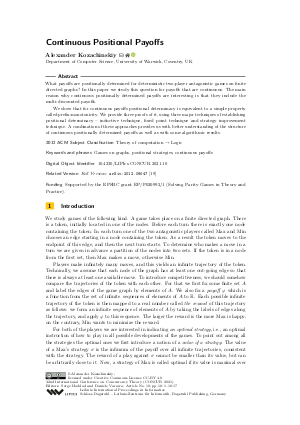Continuous Positional Payoffs
Author
Alexander Kozachinskiy 
-
Part of:
Volume:
32nd International Conference on Concurrency Theory (CONCUR 2021)
Part of: Series: Leibniz International Proceedings in Informatics (LIPIcs)
Part of: Conference: International Conference on Concurrency Theory (CONCUR) - License:
 Creative Commons Attribution 4.0 International license
Creative Commons Attribution 4.0 International license
- Publication Date: 2021-08-13
File

PDF
LIPIcs.CONCUR.2021.10.pdf
- Filesize: 0.81 MB
- 17 pages
Document Identifiers
Related Versions
- Full Version https://arxiv.org/abs/2012.09047
Subject Classification
ACM Subject Classification
- Theory of computation → Logic
Keywords
- Games on graphs
- positional strategies
- continuous payoffs
Metrics
- Access Statistics
-
Total Accesses (updated on a weekly basis)
0Document
0Metadata
Abstract
What payoffs are positionally determined for deterministic two-player antagonistic games on finite directed graphs? In this paper we study this question for payoffs that are continuous. The main reason why continuous positionally determined payoffs are interesting is that they include the multi-discounted payoffs. We show that for continuous payoffs positional determinacy is equivalent to a simple property called prefix-monotonicity. We provide three proofs of it, using three major techniques of establishing positional determinacy - inductive technique, fixed point technique and strategy improvement technique. A combination of these approaches provides us with better understanding of the structure of continuous positionally determined payoffs as well as with some algorithmic results.
Cite As Get BibTex
Alexander Kozachinskiy. Continuous Positional Payoffs. In 32nd International Conference on Concurrency Theory (CONCUR 2021). Leibniz International Proceedings in Informatics (LIPIcs), Volume 203, pp. 10:1-10:17, Schloss Dagstuhl – Leibniz-Zentrum für Informatik (2021)
https://doi.org/10.4230/LIPIcs.CONCUR.2021.10
BibTex
@InProceedings{kozachinskiy:LIPIcs.CONCUR.2021.10,
author = {Kozachinskiy, Alexander},
title = {{Continuous Positional Payoffs}},
booktitle = {32nd International Conference on Concurrency Theory (CONCUR 2021)},
pages = {10:1--10:17},
series = {Leibniz International Proceedings in Informatics (LIPIcs)},
ISBN = {978-3-95977-203-7},
ISSN = {1868-8969},
year = {2021},
volume = {203},
editor = {Haddad, Serge and Varacca, Daniele},
publisher = {Schloss Dagstuhl -- Leibniz-Zentrum f{\"u}r Informatik},
address = {Dagstuhl, Germany},
URL = {https://drops.dagstuhl.de/entities/document/10.4230/LIPIcs.CONCUR.2021.10},
URN = {urn:nbn:de:0030-drops-143874},
doi = {10.4230/LIPIcs.CONCUR.2021.10},
annote = {Keywords: Games on graphs, positional strategies, continuous payoffs}
}
Author Details
Funding
Supported by the EPSRC grant EP/P020992/1 (Solving Parity Games in Theory and Practice).
References
-
Henrik Björklund and Sergei Vorobyov. Combinatorial structure and randomized subexponential algorithms for infinite games. Theoretical Computer Science, 349(3):347-360, 2005.

-
Patricia Bouyer, Stéphane Le Roux, Youssouf Oualhadj, Mickael Randour, and Pierre Vandenhove. Games where you can play optimally with arena-independent finite memory. In 31st International Conference on Concurrency Theory (CONCUR 2020). Schloss Dagstuhl-Leibniz-Zentrum für Informatik, 2020.

-
Cristian S Calude, Sanjay Jain, Bakhadyr Khoussainov, Wei Li, and Frank Stephan. Deciding parity games in quasipolynomial time. In Proceedings of the 49th Annual ACM SIGACT Symposium on Theory of Computing, pages 252-263, 2017.

-
Thomas Colcombet and Damian Niwiński. On the positional determinacy of edge-labeled games. Theoretical Computer Science, 352(1-3):190-196, 2006.

-
Andrzej Ehrenfeucht and Jan Mycielski. Positional strategies for mean payoff games. International Journal of Game Theory, 8(2):109-113, 1979.

-
E Allen Emerson and Charanjit S Jutla. Tree automata, mu-calculus and determinacy. In FoCS, volume 91, pages 368-377. Citeseer, 1991.

-
John Fearnley. Strategy iteration algorithms for games and Markov decision processes. PhD thesis, University of Warwick, 2010.

-
Hugo Gimbert. Pure stationary optimal strategies in markov decision processes. In Annual Symposium on Theoretical Aspects of Computer Science, pages 200-211. Springer, 2007.

- Hugo Gimbert and Wieslaw Zielonka. When can you play positionnaly? In I. Fiala, V. Koubek, and J. Kratochvil, editors, Mathematical Foundations of Computer Science 2004, Lecture Notes in Comp. Sci. 3153, pages 686-697, Prague, Czech Republic, 2004. Springer. URL: https://hal.archives-ouvertes.fr/hal-00160436.
-
Hugo Gimbert and Wiesław Zielonka. Games where you can play optimally without any memory. In International Conference on Concurrency Theory, pages 428-442. Springer, 2005.

-
Hugo Gimbert and Wieslaw Zielonka. Applying blackwell optimality: priority mean-payoff games as limits of multi-discounted games. In Logic and automata, pages 331-356, 2008.

-
Erich Gradel and Wolfgang Thomas. Automata, logics, and infinite games: a guide to current research, volume 2500. Springer Science & Business Media, 2002.

-
Vladimir A Gurvich, Alexander V Karzanov, and LG Khachivan. Cyclic games and an algorithm to find minimax cycle means in directed graphs. USSR Computational Mathematics and Mathematical Physics, 28(5):85-91, 1988.

-
Nir Halman. Simple stochastic games, parity games, mean payoff games and discounted payoff games are all lp-type problems. Algorithmica, 49(1):37-50, 2007.

-
Thomas Dueholm Hansen, Peter Bro Miltersen, and Uri Zwick. Strategy iteration is strongly polynomial for 2-player turn-based stochastic games with a constant discount factor. Journal of the ACM (JACM), 60(1):1-16, 2013.

-
Ronald A Howard. Dynamic programming and markov processes. The M.I.T. Press, 1960.

-
Marcin Jurdziński. Deciding the winner in parity games is in up∩co-up. Information Processing Letters, 68(3):119-124, 1998.

-
Elon Kohlberg. Invariant half-lines of nonexpansive piecewise-linear transformations. Mathematics of Operations Research, 5(3):366-372, 1980.

- Alexander Kozachinskiy. Continuous positional payoffs. arXiv preprint, 2020. URL: http://arxiv.org/abs/2012.09047.
-
Robert McNaughton. Infinite games played on finite graphs. Annals of Pure and Applied Logic, 65(2):149-184, 1993.

-
Andrzej W Mostowski. Games with forbidden positions. Technical Report 78, Uniwersytet Gdánski, Instytut Matematyki, 1991.

-
Martin L Puterman. Markov decision processes: discrete stochastic dynamic programming. John Wiley & Sons, 2014.

-
Lloyd S Shapley. Stochastic games. Proceedings of the national academy of sciences, 39(10):1095-1100, 1953.

-
Richard S Sutton, Andrew G Barto, et al. Introduction to reinforcement learning, volume 135. MIT press Cambridge, 1998.

-
Uri Zwick and Mike Paterson. The complexity of mean payoff games on graphs. Theoretical Computer Science, 158(1-2):343-359, 1996.

